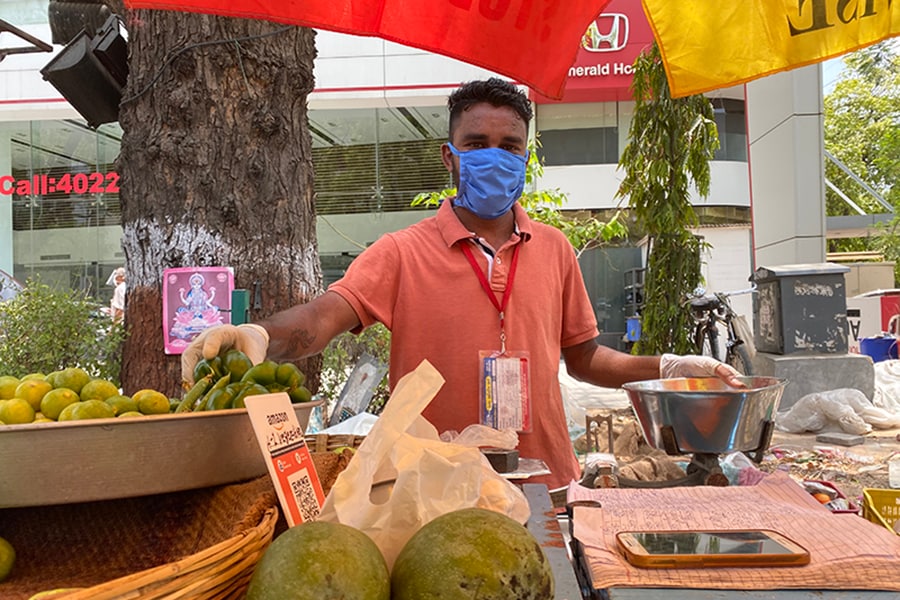A grocer, running out of groceries for his family
In the early days of the lockdown, and especially when Ahmedabad shut down all shops, vegetable vendor Bharat Laljibhai Jakhvadiya struggled to feed his family of nine


 Image: Naini Thaker
Image: Naini Thaker
At the crack of dawn, Bharat Laljibhai Jakhvadiya is set for his day. "Mask, check. Gloves, check. Sanitiser, check," he thinks to himself, as he shuts the door, watching over his sons and wife, fast asleep. Jakhvadiya drives about 10km each way on his motorcycle, to his destination by the Sabarmati bridge in Ahmedabad. While most of us have had the privilege of sleeping in late—thanks to the lockdown—Jakhvadiya has barely managed to catch a few winks in the past two months.
"Earlier, we used to get our produce from [the wholesale] Khamasa Vegetable Market. Since it is now in the red zone, the AMC (Ahmedabad Municipal Corporation) has asked vendors to sit out of the Jetalpur APMC mandi," explains Jakhvadiya, who has enlisted a relative to bring produce from Jetalpur to Sabarmati as per his order list, daily.
Jakhvadiya’s routine involves loading up a rickshaw with produce from Sabarmati, and riding alongside it on his bike to Ambawadi—where he leaves his lahari (cart). Once the cart is set up, he is open for business, by 8 am. By about 1:30 pm, he shuts shop and heads back home for lunch. "Some days, if customers come late, I get home by 4-5pm,” he says. But this is only on Mondays, Wednesdays and Fridays. “I decided to cut down my exposure outside for the safety of my family," he says.
After a late lunch, which is usually roti-sabzi-jaggery and chaas, he rests for a bit, then spends time with his family. “After dinner, we watch movies, the news or the family favourite: Crime Patrol,” he smiles. On his days off, too, the whole family gets quality time. "We try to avoid going out, unless it is very urgent," he says. By 11 PM, Jakhvadiya"s day ends he is either exhausted, or has to be up at 5 am for the next day.
With no public transport permitted initially, Jakhvadiya was stuck in limbo. How was he to bring his produce from the market, 10km away? "We had to pay a friend double the rent—Rs 800 instead of Rs 400 per day—to help us out," explains the vegetable vendor. "At the beginning of the lockdown, we would go to the market at about 2.30 am, and the police would stop us every day. Thankfully, I had a health card to show."
Getting that health card—a certificate of fitness during the pandemic—takes a full day Jakhvadiya has to get himself checked at the zonal office to get the permit. The first time, his health card was valid for seven days the second time, for 14. “Now they have told us they will come to our lahri, check everyone and then give out the new health cards,” he says.
Although he works for half a day only every alternate day, the stress of providing for his family, and putting himself out there during the pandemic, has not been easy. In the first week of the lockdown, zero income came in. "We had to exhaust our savings and leftover groceries to feed the family," he says.
Just when things were getting back to normal, the Ahmedabad Municipal Corporation announced a complete lockdown, with all vegetable, fruit and grocery shops shut. “I had given away all my stock. With barely any groceries, how was I to feed my family of nine?"
Eventually, he had to pay double the market price for vegetables and other groceries, so his family could survive for a week. "I had to wait in a line for three hours to get groceries that evening, when the [complete] lockdown was announced," he recalls.
However, things are looking up now. “I earn about Rs 1,000 to Rs 1,200 per day, since people now buy sabzi for two days in one go,” he explains. Jakhvadiya shudders to recall adjusting to the lockdown—"Wearing a mask and gloves for 8-10 hours a day was not easy. I felt like I could not breathe." Now, he has accepted this as his new normal.
This is part of a daily series on how Covid-19 has upended the lives of essential workers across the country. Read more here
First Published: Jun 02, 2020, 13:13
Subscribe Now